The Timeline of Job Background Checks Explained

Introduction to Background Checks and Their Importance for Employment
A background check is a comprehensive review of an individual’s personal history, performed by an employer, landlord, or other organizations, to verify certain details about the individual’s background. It typically involves gathering and assessing information on a candidate’s criminal history, employment records, education, and financial standing. These checks are crucial in making informed decisions, particularly in the hiring process.
In the employment context, background checks are conducted by employers to ensure that candidates possess the qualifications they claim, and to assess their suitability for a job role. Background checks help to verify an applicant’s integrity, trustworthiness, and qualifications, which ultimately safeguards the organization’s interests and ensures a safe, productive work environment.
Purpose of Background Checks in the Hiring Process
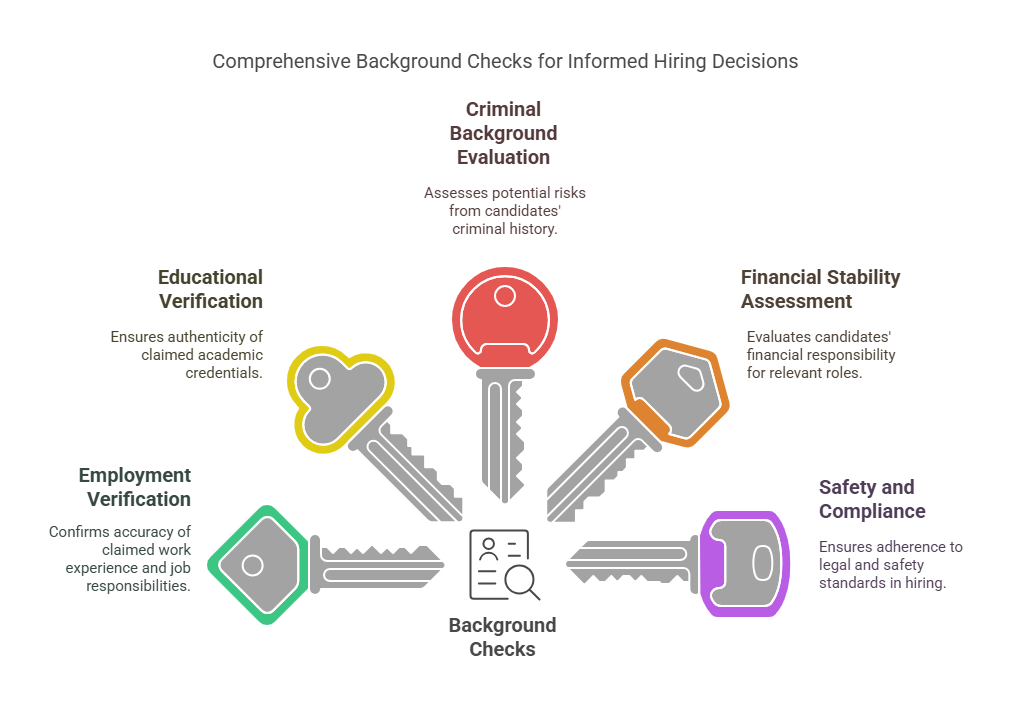
Employers use background checks for a variety of reasons, each aimed at assessing different facets of a candidate’s history. Below are some of the most common reasons why employers perform background checks:
- To Verify Employment History: Employers often verify whether candidates have the experience they claim. This can include checking previous positions held, dates of employment, job responsibilities, and reasons for leaving the previous job.
- To Confirm Educational Qualifications: To ensure that applicants have the academic credentials they list on their resume, employers check the accuracy of the degrees or certifications candidates claim to have earned.
- To Evaluate Criminal Background: Employers are increasingly conducting criminal background checks to ensure that candidates do not have a criminal history that could pose a risk to the organization or its employees.
- To Assess Financial Stability: For certain roles, especially those involving financial responsibilities, an employer may check an individual’s credit report to assess their financial stability.
- To Ensure Safety and Legal Compliance: Many industries, especially those involving vulnerable populations or sensitive information (e.g., healthcare, finance), require a detailed background check to meet legal and safety standards.
Types of Background Checks in Employment
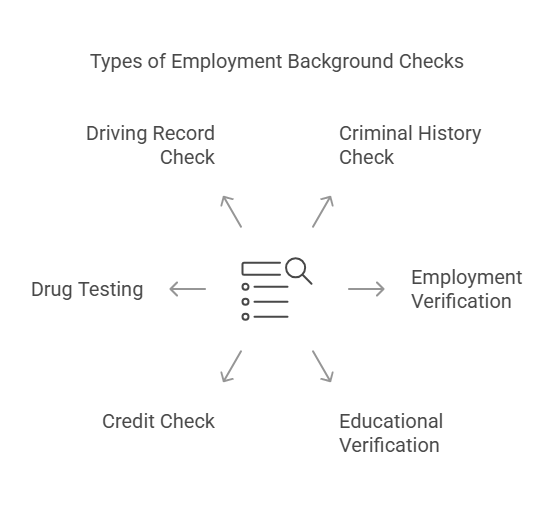
Depending on the role and industry, different types of background checks may be required. Here are some of the most common ones:
- Criminal History Check: This check is performed to see if the candidate has any prior convictions that may disqualify them from certain jobs, especially those involving vulnerable populations or sensitive data. Criminal checks can vary by state or county and may include felonies, misdemeanors, and sex offender registry searches.
- Employment Verification: Employers verify the candidate’s employment history to confirm the accuracy of job titles, dates of employment, and reasons for leaving.
- Educational Verification: This involves checking the authenticity of the educational qualifications stated by the candidate, including the school, degree, and graduation dates.
- Credit Check: Employers may perform a credit check for positions involving financial responsibility or access to company funds. It typically includes the applicant’s credit score, debt, and payment history.
- Drug Testing: Some employers may require drug testing to ensure that candidates do not have a history of substance abuse, particularly in industries where safety is a top priority.
- Driving Record Check: For roles that involve driving, such as delivery services or transportation companies, an employer may check an applicant’s driving history.
How Long Does It Take to Get Background Check Results Back?
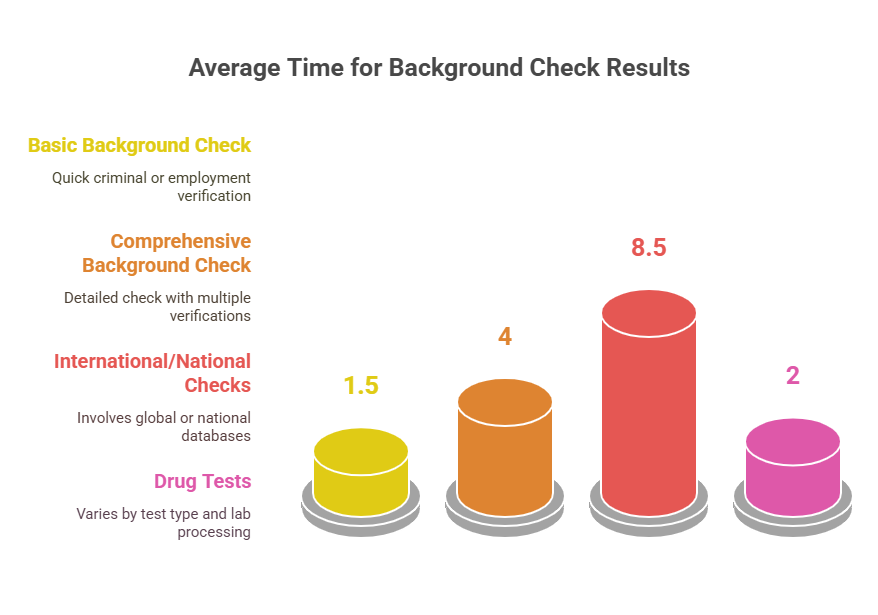
The time it takes to get a background check back depends on several factors, including the type of check being conducted, the thoroughness of the search, and the efficiency of the screening company or agency processing the check. On average, most background checks take between 1 to 5 business days. However, more complex checks can take longer. Below are some general expectations for how long different types of background checks take:
- Basic Background Check: For a criminal history check or a simple employment verification, results can often be returned within 1-2 business days.
- Comprehensive Background Check: A more detailed check involving criminal history, employment verification, education verification, and credit checks could take anywhere from 3 to 5 business days.
- International or National Checks: If the check involves international or national databases, it may take a bit longer—up to 7-10 business days.
- Drug Tests: The time required for drug test results can vary based on the type of test (urine, saliva, hair follicle, or blood) and the laboratory’s processing time. Generally, results are available within 1 to 3 business days for standard tests.
Variations Based on the Type of Check
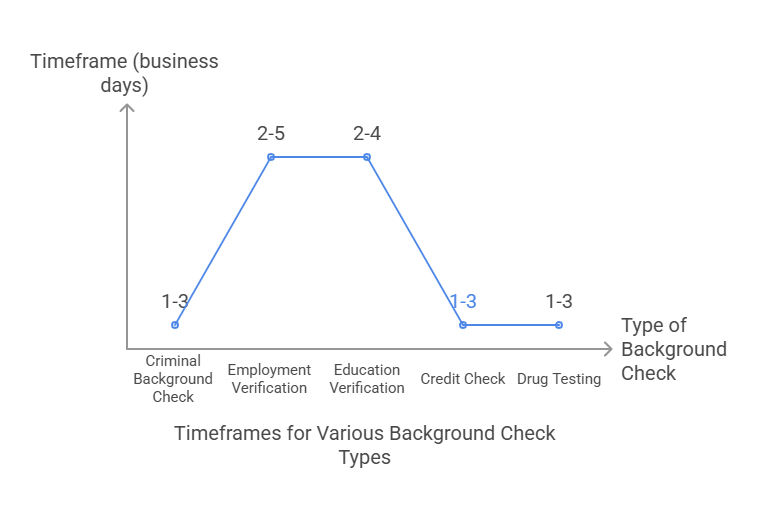
- Criminal Background Check: A criminal background check can be completed within a few hours for local and state records, but it may take longer if a national or international search is required.
- Employment Verification: Verifying past employers may take a bit longer due to the time required to contact and confirm information with previous employers. On average, this takes 2-5 business days.
- Education Verification: Contacting educational institutions to verify an applicant’s academic history may take 2-4 business days, depending on the institution’s responsiveness.
- Credit Check: A credit report can often be processed quickly, with results typically available within 1-3 business days. However, delays may occur if there is an issue with the credit history or if a manual review is required.
- Drug Testing: Depending on the method (urine, blood, saliva, or hair follicle), drug tests can take anywhere from 24 hours to 3 business days for results.
It’s important to note that employers generally aim to complete background checks promptly, but the timeframe can vary depending on the complexity of the check, the accuracy of the information provided, and the speed of third-party verification processes.
Factors Affecting the Timeframe for Job Background Checks and Services
Factors Influencing How Long Background Checks Take
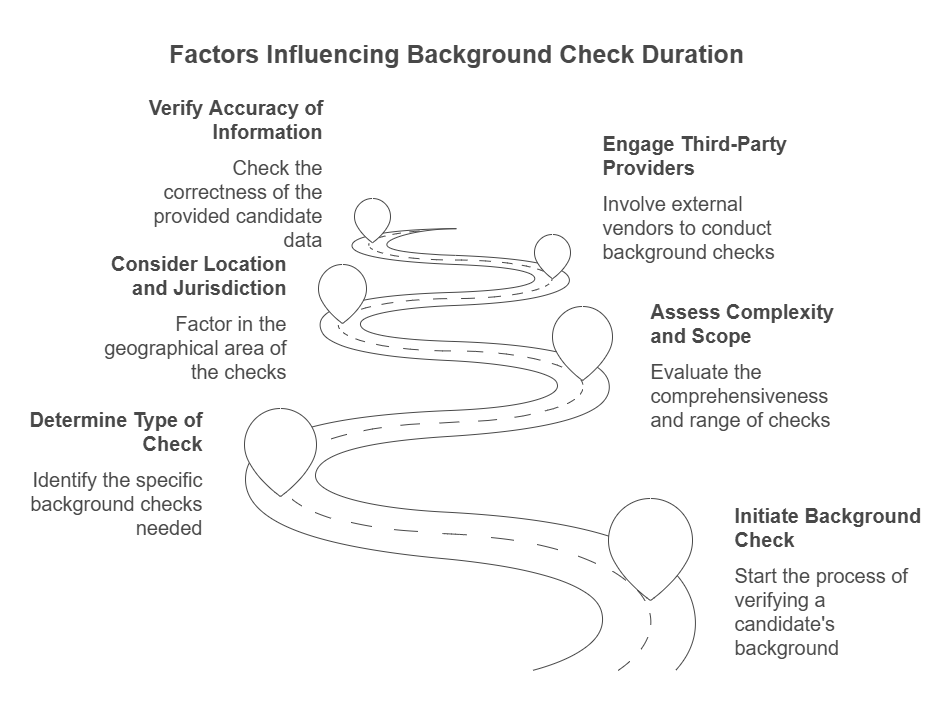
The timeframe for background checks can vary widely depending on numerous factors. It’s essential to understand the various elements that influence how long it will take to get the results. Below, we’ll break down these factors and how they impact the overall processing time for a background check.
1. Type of Background Check
One of the most significant factors affecting the duration of a background check is the type of check being performed. Each background check requires different steps and searches, and some are more time-consuming than others.
- Criminal History Check: Local or state criminal history checks are typically completed quickly. For instance, a criminal check for a specific county or state may take as little as a few hours or up to two days. However, national or international checks can take significantly longer, as they require more time to gather data from multiple jurisdictions and databases. Criminal background checks involving felony and misdemeanor searches, as well as sex offender registries, might require additional verification steps that can add days to the process.
- Employment Verification: Employment verification involves contacting past employers to confirm job titles, dates of employment, and job responsibilities. This step can take time because it relies on the responsiveness of previous employers. If there’s difficulty reaching the HR department or former employers, it could delay the verification process. On average, employment verification can take anywhere from 2-5 business days, but it may take longer if there are discrepancies or if the previous employer requires additional time to respond.
- Education Verification: Similar to employment verification, education verification involves contacting schools, universities, and other educational institutions to confirm a candidate’s degree or diploma. This can be a time-consuming process, especially if the institutions are not responsive or if the educational records are not easily accessible. It typically takes 2-4 business days, but in some cases, delays may occur if the school requires additional time to confirm academic records.
- Credit History Check: Credit checks are usually processed quickly by the major credit bureaus. These reports are often available within 1-3 business days, assuming the candidate has provided accurate and up-to-date information. However, if there are issues, such as discrepancies in the credit history or a request for manual intervention, it may take longer.
- Drug Testing: The type of drug test (urine, saliva, blood, or hair follicle) can impact the speed at which results are returned. Typically, urine tests are the quickest, with results available within 1-3 business days. Saliva tests tend to return results more quickly as well. Blood tests, on the other hand, take longer as they often require more specialized processing. Hair follicle tests can also take longer because they involve more in-depth testing for long-term drug use. Drug test results are generally available within 1-7 days depending on the testing method.
- Driving Records: When employers require a driving record check, it can take anywhere from 1-3 business days, depending on the state and the agency involved in providing the record.
2. Complexity of the Background Check
The more comprehensive the background check, the longer it will take. For instance, a basic criminal history check or a simple employment verification may take only a couple of days, while a more complex background check that includes criminal history, employment verification, education checks, credit history, and drug testing could take 1-2 weeks or even longer, depending on the circumstances.
A comprehensive background check often involves searching multiple databases, contacting various agencies and institutions, and verifying the accuracy of the information. This process takes time, and any discrepancies or difficulties locating information will only further delay the process.
3. Scope of the Search
The scope of the background check also plays a crucial role in how long it takes to process. A background check can be limited to specific areas (e.g., criminal records in one state or employment verification with only one previous employer), or it may cover a broader range of data (e.g., national or international criminal history checks, multiple past employers, and education institutions).
A background check that covers multiple states or countries will naturally take longer than a check that focuses on just one jurisdiction. Similarly, checks that involve searching national databases for criminal records, credit histories, and employment verification require additional time to compile.
4. Location and Jurisdiction
The jurisdiction or location of the background check is another factor that can influence how long it takes to get results. For example:
- Local vs. National Searches: Local checks tend to be quicker, as they only require searching through the records held within a specific area, such as a county or city. National searches, on the other hand, require more extensive searches through a broader range of databases and agencies. This additional time for nationwide or international checks can increase the overall processing time by several days.
- State-Specific Requirements: Each state has its own set of rules and processes for conducting background checks. Some states have more streamlined procedures for accessing records, while others may have more bureaucratic processes that require extra time. Additionally, some states may only provide records upon request, which could lead to delays.
5. Third-Party Service Providers and Vendors
Employers often rely on third-party background check providers to conduct screenings. These vendors typically have established relationships with agencies, universities, and other organizations that provide the required data. The efficiency of the provider can significantly influence how quickly the background check is completed.
Providers like Exact Background Checks specialize in providing fast, accurate, and comprehensive background screening services. These vendors typically have access to multiple databases, can expedite processes with automation, and may have pre-existing relationships with institutions to speed up the verification process. Some providers also offer expedited services for an additional fee, ensuring faster processing.
By partnering with a reliable background check provider, employers can ensure that they receive timely and accurate results. This is especially important for businesses that need to fill positions quickly and efficiently.
6. Accuracy of the Information Provided
Another critical factor that affects the timeline of a background check is the accuracy and completeness of the information provided by the candidate. If the applicant’s details are incorrect or incomplete, it can lead to delays. For instance, if a candidate provides incorrect employment dates or educational institution names, the background check provider may need to spend extra time trying to verify the details.
Inaccurate or missing information can cause delays, especially if further verification is required from the candidate. Additionally, discrepancies between the provided information and the findings of the background check could delay the process further as employers and vendors work to resolve the issues.
7. Response Times from Agencies and Institutions
The speed of response from the various agencies involved in the background check also plays a significant role in how long it takes to complete the process. Some agencies or institutions may have automated systems in place to provide quick responses, while others rely on manual processes that take longer.
For example, government agencies such as courts, police departments, or regulatory bodies may take longer to respond, particularly if they are processing large volumes of requests. Universities and colleges may also take time to respond to education verification requests, especially if the records are archived or difficult to access.
Exact Background Checks and Expedited Services
Exact Background Checks offers a streamlined and efficient background screening process. They specialize in providing fast and reliable background checks for businesses and individuals. With partnerships with a wide range of data providers, they can access criminal records, employment verifications, educational institutions, and other essential information quickly and accurately.
Exact Background Checks also offers expedited services for employers who need to fill positions quickly. These expedited options can significantly reduce the time it takes to complete a background check, ensuring that businesses can make hiring decisions promptly. They provide transparent and detailed timelines to ensure that employers and candidates are informed of the expected results.
Tips to Expedite the Background Check Process
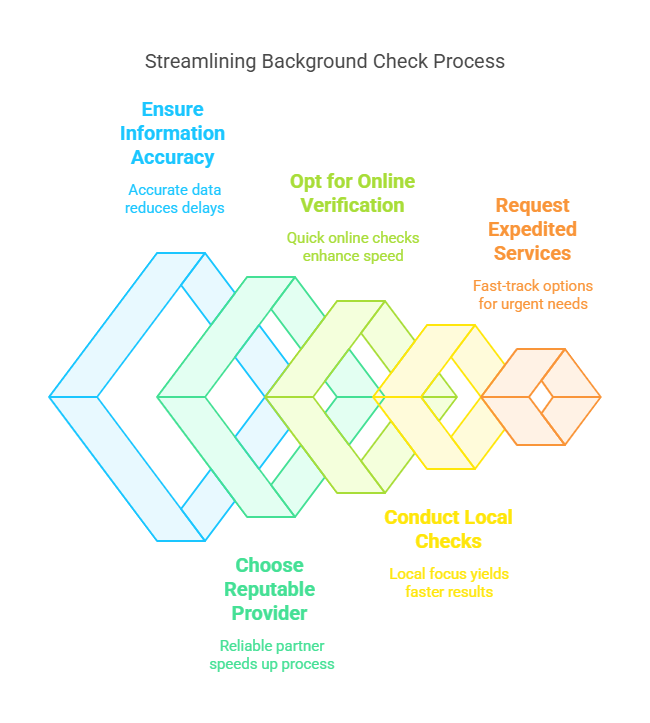
While some aspects of the background check process are beyond your control, there are a few things employers and candidates can do to speed things up:
- Ensure Accuracy of Information: The more accurate and complete the information provided, the less likely it is that delays will occur due to verification issues.
- Use a Reputable Background Check Provider: Partner with a reliable and efficient background check provider who can leverage technology and strong partnerships to expedite the process.
- Choose Online Platforms for Education and Employment Verification: When possible, opt for online databases or institutions that can provide immediate or quicker verification of academic credentials or employment history.
- Request Local Background Checks: For quicker results, consider conducting local background checks instead of national or international searches.
- Request Expedited Services: If time is critical, use expedited services, which can cut the processing time down significantly.
In the next section, we will cover the legal aspects of background checks and answer common questions related to the background check process in employment.



